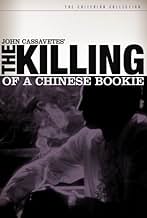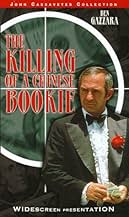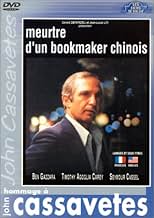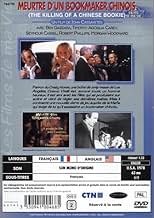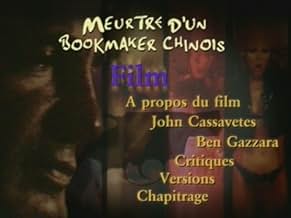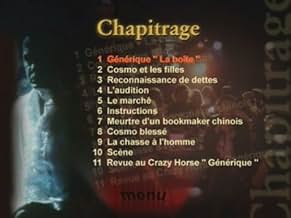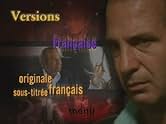El orgulloso propietario de un club de striptease se ve obligado a asumir su situación cuando su adicción al juego lo mete en problemas con la mafia, que le ofrece una sola alternativa.El orgulloso propietario de un club de striptease se ve obligado a asumir su situación cuando su adicción al juego lo mete en problemas con la mafia, que le ofrece una sola alternativa.El orgulloso propietario de un club de striptease se ve obligado a asumir su situación cuando su adicción al juego lo mete en problemas con la mafia, que le ofrece una sola alternativa.
- Flo
- (as Timothy Agoglia Carey)
- The Accountant
- (as John Red Kullers)
- Margo Donnar
- (as Donna Marie Gordon)
- Dirección
- Guionista
- Todo el elenco y el equipo
- Producción, taquilla y más en IMDbPro
Argumento
¿Sabías que…?
- TriviaDavid Bowie was often present on set during the filming and can be seen in shots of the crowd at Cosmo's Crazy Horse West.
- ErroresFlo says "That jerk Karl Marx said opium is the religion of the people."
While the actual Marx quote is "Religion is the opiate of the masses", this is likely to be an intentional misquote from the gangster, showing a lack of true education.
- Citas
Cosmo Vitelli: Now, teddy. Teddy. Everything takes work. We'll straighten it out. You know. You gotta work hard to be comfortable. Yeah, a lot of people kid themselves, you know. They-they know when they were born, they know where they're goin'... they know whether they're gonna go to heaven,whether they're gonna go to hell. They think they know that. They kid themselves. Right? But the only people... who are, you know, happy... are the people who are comfortable. That's right. Now, you take, uh, uh, carol, right? A dingbat, right? A ding-a-ling.A dingo. That's what people think she is,'cause that's the truth they want to believe. But, uh, you put her in another situation, right? Put her in a situation that's tough. Stress. Where she's up against something,you'll see she's no fool. Right. 'cause what's your truth... is my falsehood What's my falsehood is your truth and vice versa. Well, look. Look at me, right? I'm only happy when I'm angry... when I'm sad, when i can play the fool... when i can be what people want me to be rather than be myself.
- Créditos curiososOpening scene has Chinese characters scrolling up, similar to a movie from China or Hong Kong.
- Versiones alternativasThe original version runs 135 minutes. Two years after the release director John Cassavetes prepared a different theatrical cut with a running time of 108 minutes, both adding and removing scenes resulting in a different film.
- Bandas sonorasI Can't Give You Anything but Love
(uncredited)
Music by Jimmy McHugh
Lyrics by Dorothy Fields
Performed by Meade Roberts and others
It's an admirable film in concept, a sort of gangster movie focused entirely on characters, with very natural dialogue (surprisingly most of it was scripted, I would've guessed it was improvised for the most part) and some interesting visuals, as interesting as Cassavetes could manage with his miniscule budget anyhow. Yet much of the time it doesn't just seem like wanking, it IS wanking. Moreover, for all the hoopla over how formally interesting the movie is it's barely even all that cinematic, seeming more like experimental theater at times. Ben Gazzara is terrific, the saving grace of the film and the only thing which I really cared about while watching it. With a mildly interesting but still amateurish director helming the movie this couldn't be the sort of thing it wants to be. If it is not visually sophisticated, if the visual storytelling is not strong enough, it needs narrative pull from the script. It doesn't have any. Moreover, it's a character piece in which none of the characters are even remotely interesting, unless you're the sort who pats films on the back for daring to portray a character who has a certain occupation as something other than an archetype.
Now of course I will get people telling me I'm an absolute moron and can't handle anything slow or lacking in explosions and cleavage, but many times during "The Killing of a Chinese Bookie" I couldn't help but think back to "The Conversation". That's a 'slow' movie not dissimilar to this in some respects. That's also a great movie. This isn't. I think it's pretty easy to explain that as the difference between sophisticated craft and amateurish, occasionally interesting craft. The 1976 cut is a chore to sit through, and I don't think I'll ever bother with the 1978 cut.
- ametaphysicalshark
- 23 abr 2009
- Enlace permanente
Selecciones populares
- How long is The Killing of a Chinese Bookie?Con tecnología de Alexa
Detalles
- Fecha de lanzamiento
- País de origen
- Idioma
- También se conoce como
- The Killing of a Chinese Bookie
- Locaciones de filmación
- Gazzarri's, 9039 Sunset Blvd., West Hollywood, California, Estados Unidos(Interior and exteriors. Cosmo Vittelli's nightclub, Crazy Horse West.)
- Productora
- Ver más créditos de la compañía en IMDbPro
Taquilla
- Total a nivel mundial
- USD 19,399
Contribuir a esta página



